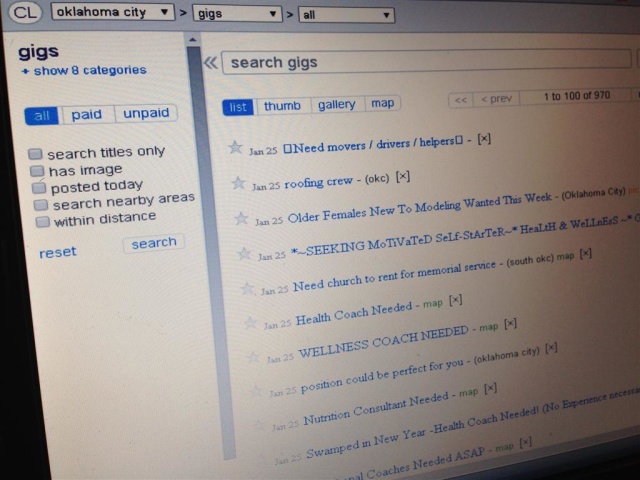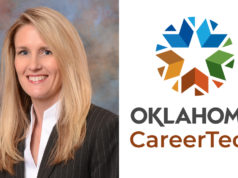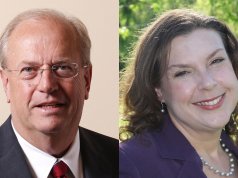
Linguist Geoff Nunberg announced his word of the year on NPR’s Fresh Air, and he nailed it: Nunberg’s choice is “gig.”
For over a century, gig was “slang for a date or engagement.” In the 1950s, hipsters and the Beats used the term for “any job you took to keep body and soul together while your real life was elsewhere.” Nunberg explains, “A gig was a commitment you felt free to walk away from as soon as you had $50 in your pocket.”
Nunberg explains that it was easy to embrace such a gig when a person had access to a “‘real job’” that was “permanent, well-paid and with benefits.” Thanks to the New Deal, strong unions and the postwar boom, he recalls, the 1950s and 1960s were America’s moment.
The gig economy
Now that we live in a “gig economy,” some millennials refer to their jobs as gigs. Other names cited for our economy include “on-demand economy … peer-to-peer economy, and “freelance nation,” as mentioned in the radio show. People who were once known as “employees” are now called “‘solopreneurs’ and ‘free range humans’ with ‘portfolio careers.’” According to Nunberg, there are workers such as “the ill-paid temps and contingent workers that some have called the ‘precariat.’”
The linguist then adds that “calling a job a gig is a luxury reserved for people who can pretend they don’t need [a job].” Most young workers still need careers, but gigs are often the best they can get. Working people must cobble “a livelihood cleaning apartments, delivering groceries and doing other people’s laundry.”
We’ve been here before
On one hand, the economic prospects of millennials are depressing. Wages for males have fallen since 1969, and the wages of women have been almost as stagnant. Truly frightening is how projections for lifetime earnings have been dropping for every generation since 1952, and it’s especially worrisome for today’s low-income children. Poor children in Oklahoma County face economic prospects that are three points lower than those of Baltimore County in Maryland.
On the other hand, I was born in 1953, which marked the midpoint between the first half of the Baby Boom and the second wave of Boomers who did not fare nearly as well. I first entered the job market after the 1973 energy crisis, which prompted the de-industrialization of America. I went to graduate school and hitchhiked around Europe and the American West. That meant I entered the job market in 1983, which was the year when our state’s unemployment rate soared to 8.4 percent, a 35-year high. During the next decade, the Reagan Administration’s Supply-Side Economics subsidized the killing of many good-paying, blue-collar jobs in Oklahoma and the rest of the nation.
After nearly a decade of cobbling together up to five gigs at a time, I became an inner-city teacher. It turned out to be the best career I could imagine. Whenever I considered subsequent offers to shift over to more respected professional positions, I realized that none of them offered the adrenaline rush of teaching at John Marshall or Centennial.
Two paths to take
All of this leads to two completely different paths that we could take as a nation. This year’s Republican presidential campaign exemplifies the route to destruction. Middle-class voters can forget the numerous ways that their affluence was due to a partnership — federal programs ranging from the GI Bill to the social safety net supplemented their hard work. Whites, especially, can misinterpret the past and claim that their families pulled themselves up solely by their bootstraps. Downwardly mobile workers might engage in a Battle Royale, blindly striking out at others whom they blame for derailing the American dream.
Or, as Derek Thompson writes in The Atlantic, Americans can reinvent our post-industrial world. We can embrace “communal creativity.” As Lawrence Katz explains in the article, an age of automated craftsmanship and artistry could unfold. The “Maker Movement” and 3-D printing could recreate artisanship. We could invest in a “digital WPA” as well as rebuild our physical capital. Rather than impose drill-and-kill education malpractice on our students, we could borrow from a long heritage of apprenticeship and provide mentoring as well as safe spaces for young people to experiment. Full-service community schools could recruit millennials to help pioneer “green” education, project-based learning and, even, teach computer programming for America.
Restore the social safety net, build on unity
That being said, it is virtually inevitable that wages will continue to fall, and lifetime earnings will drop even more than they have during the last four decades. The percentage of Oklahomans in the job market is now lower than that of the bust years of the 1980s. If the number of hours per week drops enough and job-sharing works, the creative use of that time could be used for urban agriculture and other activities that will complement old-fashioned wages. It is hard to believe that this entrepreneurialism will be nearly enough, however, unless we restore the social safety net.
And that might be a key to our success: If Americans unite against those who would turn the clock back to Social Darwinism, that success could propel us forward. We could build on that unity to create dynamic and democratic shared spaces. We could retire the phrase “just a job” and turn our gigs and our careers into callings.






















